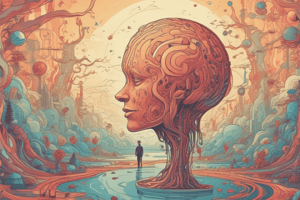Podcast
Questions and Answers
Which of the following perspectives emphasizes the role of internal structures and thoughts?
Which of the following perspectives emphasizes the role of internal structures and thoughts?
- Cognitive Psychology (correct)
- Evolutionary Psychology
- Social & Cultural Psychology
- Developmental Psychology
What does the psychodynamic perspective primarily investigate?
What does the psychodynamic perspective primarily investigate?
- Biological determinants of behavior
- Evolved psychological mechanisms
- Observable behavior and responses
- The role of the unconscious mind (correct)
Which perspective of psychology focuses solely on observable behavior?
Which perspective of psychology focuses solely on observable behavior?
- Psychodynamic Psychology
- Biological Psychology
- Cognitive Psychology
- Behavioural Psychology (correct)
In which perspective are biological events considered key to understanding behavior?
In which perspective are biological events considered key to understanding behavior?
What is the main focus of evolutionary psychology?
What is the main focus of evolutionary psychology?
Which perspective of psychology considers the influence of culture on an individual's perspective?
Which perspective of psychology considers the influence of culture on an individual's perspective?
Which major challenge did psychology face as it emerged as a science?
Which major challenge did psychology face as it emerged as a science?
According to the content, who was a significant critic of scientific psychology in the 18th century?
According to the content, who was a significant critic of scientific psychology in the 18th century?
What did Neil Weinstein's study reveal about college students' perceptions of risk?
What did Neil Weinstein's study reveal about college students' perceptions of risk?
Which cognitive bias involves overestimating the likelihood of events based on how easily examples come to mind?
Which cognitive bias involves overestimating the likelihood of events based on how easily examples come to mind?
What is one potential effect of framing information?
What is one potential effect of framing information?
Hindsight bias is more likely to occur under which condition?
Hindsight bias is more likely to occur under which condition?
How does the placebo effect work?
How does the placebo effect work?
Which of the following statements best describes the concept of availability heuristic?
Which of the following statements best describes the concept of availability heuristic?
What does negativity bias refer to?
What does negativity bias refer to?
Which of the following best describes how salience affects our understanding of information?
Which of the following best describes how salience affects our understanding of information?
How does personal experience contribute to bias?
How does personal experience contribute to bias?
In what way can a bias potentially lead to a correct conclusion?
In what way can a bias potentially lead to a correct conclusion?
What is optimism bias commonly associated with?
What is optimism bias commonly associated with?
What does motivated reasoning involve?
What does motivated reasoning involve?
Which of the following best describes the sunk cost fallacy?
Which of the following best describes the sunk cost fallacy?
What is a potential consequence of optimism bias?
What is a potential consequence of optimism bias?
What common phenomenon may cause a person to justify a poor decision?
What common phenomenon may cause a person to justify a poor decision?
Which situation exemplifies the effects of the sunk cost fallacy?
Which situation exemplifies the effects of the sunk cost fallacy?
What does the endowment effect demonstrate about people's valuation of owned items?
What does the endowment effect demonstrate about people's valuation of owned items?
How does loss aversion influence people's reaction to change?
How does loss aversion influence people's reaction to change?
What is the slippery scale fallacy primarily concerned with?
What is the slippery scale fallacy primarily concerned with?
What characterizes actively open-minded thinking?
What characterizes actively open-minded thinking?
Which statement best describes upside-down thinking?
Which statement best describes upside-down thinking?
What does loss aversion imply about emotional responses to gains and losses?
What does loss aversion imply about emotional responses to gains and losses?
What type of argument concludes with an extreme, illogical result?
What type of argument concludes with an extreme, illogical result?
What is a key feature of a non-fallacious argument?
What is a key feature of a non-fallacious argument?
Which philosopher is considered the father of modern philosophy?
Which philosopher is considered the father of modern philosophy?
What belief did ancient Greek philosophers begin to question?
What belief did ancient Greek philosophers begin to question?
What viewpoint is John Locke associated with?
What viewpoint is John Locke associated with?
Which concept did René Descartes advocate regarding knowledge?
Which concept did René Descartes advocate regarding knowledge?
What metaphor did John Locke use to describe the mind?
What metaphor did John Locke use to describe the mind?
What was the significance of the year 1879 in psychology?
What was the significance of the year 1879 in psychology?
How do psychologists view disagreement and conflict in their discipline?
How do psychologists view disagreement and conflict in their discipline?
What time period is considered the beginning of systematic thinking about human behavior?
What time period is considered the beginning of systematic thinking about human behavior?
Study Notes
Human Decision-Making: Rational vs. Irrational
- Examines whether humans primarily make logical decisions or are influenced by emotions and biases leading to irrational choices.
- Behaviorism emphasizes observable behaviors and responses to stimuli, avoiding speculation on internal mental states.
- Prominent figures: John Watson and B.F. Skinner, who believed psychology should focus solely on measurable phenomena.
Major Perspectives of Psychology
- Behavioral: Focuses on observable behavior and learned responses.
- Cognitive: Investigates internal mental structures, thoughts, and beliefs.
- Biological: Explores biological processes and events linked to behavior.
- Evolutionary: Considers the role of evolved mechanisms in human psychology.
- Developmental: Evaluates changes in behavior and cognitive abilities across the lifespan.
- Psychodynamic: Investigates unconscious influences and internal mental states.
- Social & Cultural: Analyzes the effects of cultural and societal contexts on individual perspectives and behaviors.
The Importance of Science in Psychology
- Psychology had to prove its scientific validity upon emergence as a legitimate discipline.
- Philosophers like Immanuel Kant questioned the potential for a scientific basis in psychology, suggesting it may not meet the standards of other scientific disciplines.
- Many early scholars in psychology had a robust scientific background, indicating a blend of philosophy and empirical study.
Biases and Errors in Reasoning
- Bias: Allows for potential correct conclusions in specific situations; tied to personal backgrounds and experiences.
- Mistakes: Defined as always incorrect, leading to erroneous conclusions if biases persist over time.
Common Cognitive Biases
- Optimism Bias: Motivates goal pursuit but can lead to poor decision-making.
- Sunk Cost Fallacy: Continuing with decisions based on prior investments regardless of current relevance or outcomes.
- Availability Bias: Overestimation of event likelihood based on memorable or easily recalled examples.
- Hindsight Bias: The tendency to believe one "knew it all along" after the fact, particularly evident with negative outcomes.
- Placebo Effect: Positive responses based on belief in treatment effectiveness, even with inert substances.
- Loss Aversion: Emphasizes fear of loss over potential gains, impacting decision-making.
Fallacies in Reasoning
- Sliding Scale Fallacy: Assumes one event will inevitably lead to an extreme outcome without evidence.
- Active Open-Minded Thinking: Willingness to change beliefs when presented with new evidence, promoting flexibility in thinking.
- Upside-Down Thinking: Innovative problem-solving approach that challenges existing assumptions.
Historical Context of Psychology
- Psychology's definition and study date back over 600 years, though it became more formalized with Wilhelm Wundt’s lab in 1879.
- René Descartes championed rationalism, suggesting that knowledge is innate and arises from nature.
- John Locke's empiricism posited that knowledge derives from experience, likening the mind to a blank slate shaped by nurture.
Tension and Conflict in Psychology
- Disagreement among psychologists can drive progress within the discipline, highlighting the necessity for ongoing discussion and inquiry.
- Philosophers have historically debated the influence of emotions versus rational thought on human decision-making.
Studying That Suits You
Use AI to generate personalized quizzes and flashcards to suit your learning preferences.
Related Documents
Description
This quiz explores the major perspectives of psychology, focusing on human decision-making and the debate between rational and irrational choices. It includes insights from behaviorism, cognitive, biological, evolutionary, developmental, psychodynamic, and social perspectives. Test your understanding of how these theories shape our view of human behavior.




